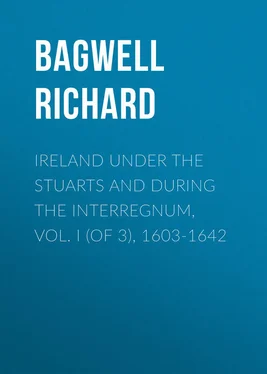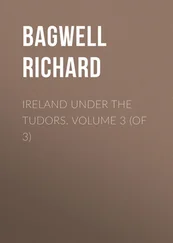Richard Bagwell - Ireland under the Stuarts and during the Interregnum, Vol. I (of 3), 1603-1642
Здесь есть возможность читать онлайн «Richard Bagwell - Ireland under the Stuarts and during the Interregnum, Vol. I (of 3), 1603-1642» — ознакомительный отрывок электронной книги совершенно бесплатно, а после прочтения отрывка купить полную версию. В некоторых случаях можно слушать аудио, скачать через торрент в формате fb2 и присутствует краткое содержание. Жанр: foreign_antique, foreign_prose, на английском языке. Описание произведения, (предисловие) а так же отзывы посетителей доступны на портале библиотеки ЛибКат.
- Название:Ireland under the Stuarts and during the Interregnum, Vol. I (of 3), 1603-1642
- Автор:
- Жанр:
- Год:неизвестен
- ISBN:нет данных
- Рейтинг книги:4 / 5. Голосов: 1
-
Избранное:Добавить в избранное
- Отзывы:
-
Ваша оценка:
- 80
- 1
- 2
- 3
- 4
- 5
Ireland under the Stuarts and during the Interregnum, Vol. I (of 3), 1603-1642: краткое содержание, описание и аннотация
Предлагаем к чтению аннотацию, описание, краткое содержание или предисловие (зависит от того, что написал сам автор книги «Ireland under the Stuarts and during the Interregnum, Vol. I (of 3), 1603-1642»). Если вы не нашли необходимую информацию о книге — напишите в комментариях, мы постараемся отыскать её.
Ireland under the Stuarts and during the Interregnum, Vol. I (of 3), 1603-1642 — читать онлайн ознакомительный отрывок
Ниже представлен текст книги, разбитый по страницам. Система сохранения места последней прочитанной страницы, позволяет с удобством читать онлайн бесплатно книгу «Ireland under the Stuarts and during the Interregnum, Vol. I (of 3), 1603-1642», без необходимости каждый раз заново искать на чём Вы остановились. Поставьте закладку, и сможете в любой момент перейти на страницу, на которой закончили чтение.
Интервал:
Закладка:
Neither his relations with his own mother nor with Queen Elizabeth had given any reason to suppose that the new king was attached to the religion of Rome. Tyrone had offered his services to James years before, and was told that he would be reminded of this when it should please God ‘to call our sister the Queen of England to death.’ After his raid in Munster Tyrone wrote in rather a triumphant strain, but still obsequiously, to the King of Scots. This did not prevent James from offering his help to Elizabeth when the Spaniards took Kinsale, for which she thanked him. A rumour that his Majesty was a Catholic was nevertheless widely circulated in Ireland, and caused a strange ferment in the corporate towns. Much stress was also laid upon his descent from ancient Irish kings. During the Queen’s later years mass had been freely celebrated in private houses, and a strong effort was now generally made to celebrate it publicly in the churches. Jesuits, seminaries, and friars, says the chronicler Farmer, ‘now came abroad in open show, bringing forth old rotten stocks and stones of images, &c.’ The agitation was strong in Kilkenny, Thomastown, Waterford, Limerick, Cork, and in the smaller Munster towns; and even Drogheda, ‘which since the conquest was never spotted with the least jot of disloyalty,’ did not altogether escape the contagion. In the latter town a chapel had long been connived at, but the municipal officers firmly repressed the agitation and even committed a man who had ventured to express a hope of open toleration. Mountjoy declared himself satisfied, but a note in his hand shows that he was still suspicious. Probably he thought it wiser not to have north and south upon his hands at the same time. 2 2 In Cambrensis Eversus , published in 1662, John Lynch says ‘the Irish no longer wished to resist James (especially as they believed that he would embrace the Catholic religion), and submitted not unwillingly to his rule, as to one whom they knew to be of Irish royal blood,’ iii. 53. Lynch was a priest in 1622. Stephen Duff, Mayor of Drogheda, to the Lord Deputy and Council, April 13; Mountjoy to Cecil, April 19, 25 and 26; Francis Bryan, sovereign of Wexford, to Mountjoy, April 23. James VI. to Tyrone, December 22, 1597, in Lansdowne MSS. lxxxiv. Tyrone to James VI., April 1600 in the Elizabethan S.P. Scotland . Letters of Elizabeth and James , Camden Society, p. 141. Farmer’s Chronicle .
On the evening of March 26, Carey reached Holyrood with the news of Queen Elizabeth’s death, and on the 28th Mountjoy was appointed Lord Deputy by Privy Seal. Before this was known in Ireland the Council there had elected him Lord Justice according to ancient precedent; so that practically there was no interregnum. Ulster was now almost quiet, and the Viceroy could draw enough troops from thence to make any resistance by the corporate towns quite hopeless. On April 27 he marched southwards with about 1,200 foot, of whom one-third were Irish, and 200 horse. At Leighlin he was joined by Ormonde, who had been opposed by the Kilkenny people acting under the advice of Dr. James White of Waterford, a Jesuit, and of a Dominican friar named Edmund Barry, who was said to be James Fitzmaurice’s son. Ormonde was accompanied by Sir Richard Shee, the sovereign, who was an adherent of his, and Mountjoy was easily induced to pardon the townsmen upon their making humble submission. Dr. White was vicar-apostolic in Waterford, and his authority seems to have been recognised in Ossory also, there being at this time no papal bishop in either diocese. He forbade the people to hear mass privately, and enjoined them to celebrate it openly in the churches, some of which he reconsecrated. Barry went so far as to head a mob in attacking the suppressed convent of his order, which was used as a sessions-house. The benches and fittings were broken up, and the conqueror said mass in the desecrated church. This friar came to Mountjoy, said that he had believed himself to be acting in a way agreeable to the King, and promised to offend no further now that his Majesty’s pleasure to the contrary was known. The Lord Deputy did not enter Kilkenny, but went straight to Thomastown, which had behaved in the same way. The town being small and penitent, it was thought punishment enough that the army should halt there for the night. Wexford had already fully submitted by letter, and Mountjoy marched from Thomastown to within four miles of Waterford, and there he encamped on the fourth day after leaving Dublin. 3 3 Muster of the army, April 27; Lord Deputy and Council to the Privy Council, Mountjoy to Cecil, and Sir G. Carey to Cecil, May 4; Humphrey May to Cecil, May 5.
The Suir at Waterford was unbridged until 1794, and the citizens doubtless thought that Mountjoy would be long delayed upon the left bank. But Ormonde, who had proclaimed King James at Carrick some weeks before, now brought enough boats from that place to carry over the whole army. Mountjoy encamped at Gracedieu, about a mile and a half above the city. There could now be no question of resistance, but some of the citizens came out and pleaded that by King John’s charter they were not obliged to admit either English rebel or Irish enemy, though they would receive the Deputy and his suite. As against a viceroy this argument was in truth ridiculous, and the Lord Deputy had only to say that his was the army which had suppressed both rebels and enemies. If resistance were offered he would cut King John’s charter with King James’s sword. It was then urged that the mayor had no force to restrain the mob unless the popular leaders could be gained over. Mountjoy consented to see Dr. White – who had just preached a sermon at St. Patrick’s, in which he called Queen Elizabeth Jezebel – and a Dominican friar who had acted with him. Sir Nicholas Walsh the recorder had been pulled down from the market cross when he attempted to proclaim King James, and Sir Richard Aylward, who was a Protestant, had escaped with difficulty, some citizens expressing regret that they had not both lost their heads. Walsh thought he owed his preservation more to having relations among the crowd than to any dregs of loyal compunction. The Jesuit and the Dominican now came to the camp in full canonicals and with a cross borne before them, which Mountjoy at once ordered to be lowered. White fell on his knees, protesting his loyalty and acknowledging the King’s right. A discussion arose as to the lawfulness of resistance to the royal authority, and the book learning which Essex had made a reproach to Mountjoy now stood him in good stead. According to one not very probable account, the Lord Deputy had a copy of St. Augustine in his tent, and convicted White of misquoting that great authority. ‘My master,’ he said, ‘is by right of descent an absolute King, subject to no prince or power upon the earth; and if it be lawful for his subjects upon any cause to raise arms against him, and deprive him of his regal authority, he is not then an absolute King, but hath only precarium imperium . This is our opinion of the Church of England, and in this point many of your own great doctors agree with us.’ James was of course no absolute king in our sense of the word, for he had no power to impose taxes; but the long reign of Elizabeth, the wisdom which had on the whole distinguished her, and the terrible dangers from which she saved England, had taught men to look upon the sceptre as the only protection against anarchy or foreign rule. Experience of Stuart kingcraft was destined to modify public opinion. 4 4 Authorities last quoted; also Smith’s Waterford .
Интервал:
Закладка:
Похожие книги на «Ireland under the Stuarts and during the Interregnum, Vol. I (of 3), 1603-1642»
Представляем Вашему вниманию похожие книги на «Ireland under the Stuarts and during the Interregnum, Vol. I (of 3), 1603-1642» списком для выбора. Мы отобрали схожую по названию и смыслу литературу в надежде предоставить читателям больше вариантов отыскать новые, интересные, ещё непрочитанные произведения.
Обсуждение, отзывы о книге «Ireland under the Stuarts and during the Interregnum, Vol. I (of 3), 1603-1642» и просто собственные мнения читателей. Оставьте ваши комментарии, напишите, что Вы думаете о произведении, его смысле или главных героях. Укажите что конкретно понравилось, а что нет, и почему Вы так считаете.












